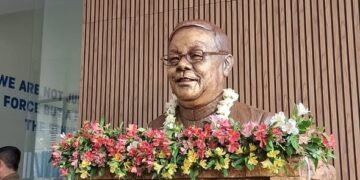Amidst the clamour for inclusion of Khasi, Garo languages in the 8th Schedule of the Constitution, which the Central Government has not given any assurance as yet, the Meghalaya government has come up with a proposal of making the two languages compulsory for students up to Class 4 across the state. This thought was put up after extensive research that children pick up languages extremely quickly between that age group and multilingualism has great cognitive benefits to young students.
Many languages are facing the threat of extinction due to people’s love for English, and those who speak it are often seen as a sign of education, social standing, and access to opportunities. While it’s a global language and valuable for international communication, parents can encourage their children to learn their mother tongue. As it is, a majority of parents, particularly in urban areas and among families, start saying English words with a desire to give children a head start in education.
Research suggests teaching and learning in the mother tongue builds strong foundations for a child’s cognitive development, improves communication skills, and helps a child to create an emotional connection between the child and their learning environment. More importantly, children taught in their mother language tend to perform better academically in the long run. A child’s brain is highly receptive to new stimuli and experiences, making them quick to pick up language, behaviours, and knowledge from their environment. Therefore there is no harm in waiting but work on preventing and minimising language attrition, which is dangerous to a community because it can lead to the loss of cultural heritage, unique knowledge, and a sense of identity, potentially causing social and economic marginalisation.
As per the proposal, the State Government also wants introduction of mandatory sister language exposure, whereby Khasi/Jaiñtia students will learn basic Garo, and Garo students will learn basic Khasi. It will be a good sign if this proposal receives a nod from the stakeholders that will not only build cognitive skills and academic performance to cultural awareness but to enhance social skills and especially empathy which is crucial for fostering strong relationships, understanding diverse perspectives, and promoting positive social interactions, in multilingual environments.
If all stakeholders agree to the proposal the citizens should consider themselves fortunate that the government is aware of the magnitude of the problem of language attrition and is setting a roadmap to lay a solid foundation for children’s education that require coordination and cooperation of all players in the education ecosystem—government, civil society, schools, parents, teachers, community members and others.
The coming generations should be grounded in their mother tongue without muttering code-mixing or ‘Khalish’.


























